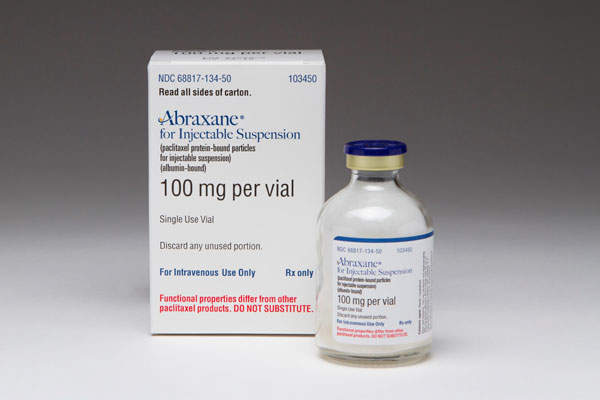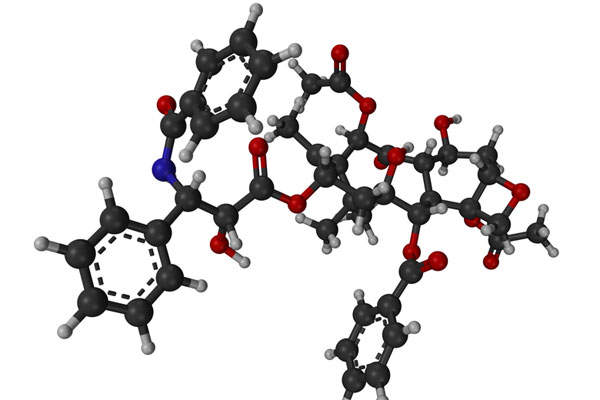Abraxane (albumin-bound paclitaxel for injectable suspension) is an intravenous injection indicated for the treatment of metastatic pancreatic cancer. The drug was originally developed by Abraxis BioScience, which was acquired by Celgene Corporation in October 2010.
Celgene obtained approval from the US Food and Drug Administration (FDA) for Abraxane to treat late stage pancreatic cancer in September 2013.
Abraxane received the FDA approval for the treatment of breast cancer in 2005 and non-small cell lung cancer in 2012.
The drug is currently under review of European Media Authority (EMA) for marketing approval in Europe.
Pancreatic cancer details
Pancreatic cancer originates in the tissues of the pancreas due to the uncontrolled malignant cell growth. The disease is usually detected at a late stage. It impacts men 30% more often than women.
Pancreatic cancer is the fourth leading cause of death in the US (due to cancer). According to the National Cancer Institute’s estimates, about 45,220 patients will be diagnosed and 38,460 will die from the disease in 2013.
Abraxane’s mechanism of action
Abraxane contains an albumin-bound form of paclitaxel, which belongs to a mitotic inhibitor drug class. It is a chemotherapy drug that works by slowing down the growth of certain tumours.
The drug is used in combination with another chemotherapy drug called gemcitabine, which stops the growth of malignant cancer cells in the pancreas.
Abraxane is available in 100mg dose per vial for intravenous administration.
Clinical trials on Celgene Corporation’s Abraxane
Celgene conducted Phase I/II clinical trials on Abraxane between November 2006 and December 2010. It was a non-randomised, open label and parallel assignment. The study enrolled 67 participants. The primary outcome measure was the number of participants with dose-limiting toxicities. The secondary outcome measure included the number of participants with adverse events, percentage of participants who achieved an objective confirmed overall response, percentage of participants with disease control and progression-free survival.
Celgene initiated a Phase II clinical study on Abraxane in May 2011. It was an open label, single group assignment and efficacy study. The study enrolled 25 patients. The primary outcome measure included Grade III/IV histological response in tumour specimen rate after induction therapy. The secondary outcome measures included number of participants with adverse events, tumour response rate to therapy and resection rate at surgery.
The safety, tolerability and effectiveness of Abraxane was confirmed in a Phase III clinical trial. The study enrolled 861 patients. The patients were randomly administered with Abraxane plus gemcitabine or gemcitabine alone.
The study results demonstrated that patients who were treated with Abraxane plus gemcitabine lived, on average, 1.8 months longer than those treated with gemcitabine alone.
The study also showed that patients who were treated with Abraxane plus gemcitabine experienced a delay in tumour growth compared to participants who received gemcitabine alone.
The common side effects encountered by Abraxane plus gemcitabine-treated participants during the clinical study included decrease in infection-fighting white blood cells, a reduced level of platelets in the blood, fatigue, nerve damage in the arms and legs, nausea, hair loss, tissue swelling, diarrhoea, fever, vomiting, rash and dehydration.
Marketing commentary for Celgene’s cancer treatment
Celgene Corporation is an integrated global biopharmaceutical company with its headquarters located at Summit in New Jersey.
The company is engaged in the discovery, development and commercialisation of treatments for cancer and inflammatory diseases through gene and protein regulation. It acquired the Abraxis drug from Abraxis BioScience for $2.9bn in 2010.
Celgene holds the marketing rights of Abraxis in the US. The company made revenue of $426.6m in 2012 through the sales of Abraxane.
Other popular pancreatic cancer drugs in the US include Sutent which was developed by Pfizer.
Related content
Gilotrif (afatinib) for Treatment of Metastatic Non-Small cell Lung Cancer
Gilotrif (afatinib) is an orally administered drug that is indicated as the first-line treatment for metastatic non-small cell lung cancer (NSCLC) patients with epidermal growth factor receptor (EGFR) mutations.
Provenge – Treatment for Advanced Prostate Cancer
Provenge (sipuleucel-T) is an autologous cellular immunotherapy used intravenously in the form of infusion for the treatment of men with advanced prostate cancer. The drug was developed by the Dendreon Corporation.




